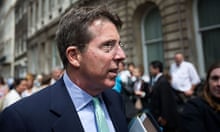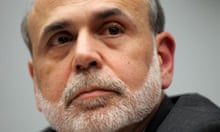Britain is abuzz with the Libor scandal, but so far it's been a yawn in the United States. That's because Americans have assumed that the wrongdoing is confined to the other side of the pond. After all, "Libor" is short for "London interbank offered rate", and the main culprit to date has been London-based Barclays. It's further assumed that the scandal hasn't really affected the pocketbooks of average Americans anyway.
Wrong, on both counts. It's becoming apparent that Barclays' reach extends far into the US financial sector, as evidenced by its $453m settlement with American as well as British bank regulators, and the US justice department's active engagement in the case. Even by American standards, the Barclays traders' emails are eyepopping, offering a particularly a chilling picture of how easily they got their colleagues to rig interest rates in order to make big bucks. (Bob Diamond, the former Barclays CEO, says the emails made him "physically ill" – perhaps because they so patently reveal the corruption.)
Most importantly, Wall Street will almost surely be implicated in the scandal. The biggest Wall Street banks – including the giants JP Morgan Chase, Citigroup and Bank of America – are likely to have been involved in similar manoeuvres. Barclay's couldn't have rigged the Libor without their witting involvement. The reason they'd participate in the scheme is the same reason Barclay's did – to make more money.In fact, Barclays' defence has been that every major bank was fixing Libor in the same way, and for the same reason. And Barclays is "co-operating" (giving damning evidence about other big banks) with the justice department and other regulators in order to avoid steeper penalties or criminal prosecutions, so fireworks in the US can be expected.
There are really two different Libor scandals, and both are about to hit America's shores. The first has to do with a period just before the financial crisis, around 2007, when Barclays and, presumably, other major banks submitted fake Libor rates lower than the banks' actual borrowing costs in order to disguise how much trouble they were in. This was bad enough. Had American regulators known then, they might have taken action earlier to diminish the impact of the near financial meltdown of 2008.
But the other scandal is worse, and is likely to get the blood moving even among Americans who assume they've already seen all the damage Wall Street can do. It involves a more general practice – starting around 2005 and continuing until … who knows, it might still be going on – to rig the Libor in whatever way necessary to assure the banks' bets on derivatives would be profitable. This is insider trading on a gigantic scale. It makes the bankers winners and the rest of us – whose money they've used to make their bets – losers and chumps.
Obviously, Libor is not limited to the UK. As the benchmark for trillions of dollars of loans worldwide – mortgage loans, small-business loans, personal loans – it affects the most basic service banks provide: borrowing money and lending it out. People put their savings in a bank to hold in trust, and the bank agrees to pay interest on those. And people borrow money from the bank and agree to pay the bank interest.
The typical saver or borrower on both sides of the Atlantic trusts that the banking system is setting today's rate based on its best guess about the future worth of the money. And we assume that the banks' guess is based, in turn, on the cumulative market predictions of countless lenders and borrowers all over the world about the future supply and demand for money.
But if that assumption is wrong – if the bankers are manipulating the interest rate so they can place bets with the money we lend or repay them, bets that will pay off big for them because they have inside information on what the market is really predicting which they're not sharing with the rest of us – it's a different story altogether.
It would amount to a rip-off of almost cosmic proportions – trillions of dollars that average people would otherwise have received or saved on their lending and borrowing that have been going to the bankers instead.
It would make the other abuses of trust Americans have witnessed in recent years – predatory lending, fraud, excessively risky derivative trading with commercial deposits, and cozy relationships with credit-rating agencies – look like child's play by comparison.
What can we expect when and if the full import of this scandal is understood in America? Most Americans suffer outrage fatigue when it comes to Wall Street. Its excesses have already wrought havoc to the lives of millions of Americans, causing taxpayers to shell out billions (of which only a portion has been repaid).
They are also cynical that anything will ever be done to stop these abuses because the Street is too powerful. To date, not a single top financial executive has been charged with a crime in connection with the excesses that led to the near-meltdown of 2008. Indeed, America's top financial executives are back to making more money than ever. And their political power (via campaign contributions) has already eviscerated much of the Dodd-Frank law that was supposed to rein them in – including the so-called Volker rule that was sold to Wall Street as a milder version of the old Glass-Steagall Act that used to separate investment banking from commercial banking.
But we may be reaching a tipping point where Americans move beyond outrage to political action. Recall that the bailout of Wall Street gave birth to both the Tea Partiers and Occupiers. Across America, one hears a growing demand that Glass-Steagall be reinstituted and that the biggest banks be broken up. Not long ago, the Dallas branch of the Federal Reserve, hardly known as a bastion of radicalism, proposed that the biggest banks had become too big to regulate and should be shrunk.
The pertinent question here is whether the unfolding Libor scandal, which will soon hit these shores, will provide enough ammunition and energy to finally get the job done.







